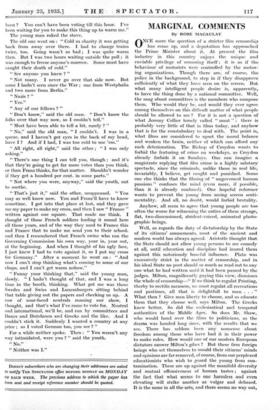MARGINAL COMMENTS
By ROSE MACAULAY
ONCE more the question of a stricter film censorship has come up, and a deputation has approached the Prime Minister about it. At present the film industry in this country enjoys the unique and enviable privilege of censoring itself ; it is as if the behaviour of motorists were controlled by the motor- ing organizations. Though there are, of course,, the police in the background, to step in if they disapprove sufficiently of what they have seen on the screen. But what many intelligent people desire is, apparently, to have the thing done by a national committee. Well, the snag about committees is the members who compose them. Who would they be, and would they ever agree among themselves on this difficult matter of what people should be allowed to see ? For it' is not a question of what Jeremy Collier tersely called " smut " : there is probably very little of that in films today, and anyhow that is for the constabulary to deal with. The point is, whit films are considered to upset the moral balance and weaken the brain, neither of which can afford any such deterioration. The Bishop of Croydon wants to forbid the featuring of crime on weekdays, as Croydon already forbids it on Sundays. One can imagine. a magistrate replying that film crime is a highly salutary spectacle, since the criminals, unlike those in real life; invariably, I believe, get caught and punished. Some one else thinks that the filming of " ungoverned human passions " confuses the mind (even more, if possible, than it is already confused). One hopeful reformer wants to prevent the young from seeing screen senti- mentality. And all, no doubt, would forbid brutality.
Anyhow, all seem to agree that young people are too often the worse for witnessing the antics of.these strange, flat, two-dimensioned, strident-voiced, animated photo- graphic beings.
Well, as regards the duty of dictatorship by the State of its citizens' amusements, most of the ancient and modern world has always agreed. Aristotle thought that the State should not allow young persons to see comedy at all, until education and discipline had inured them against this notoriously baneful influence. Plato was excessively strict in the matter of censorship, and in his ideal State no poet should so much as read out to any one what he had written until it had been passed by the judges. Milton, magnificently guying this view, dismisses the whole of censorship—" If we think to regulat Printing, therby to rectifie manners, we must regulat all recreations and pastimes, all that is delightfull to man . . " What then ? Give men liberty to choose, and so educate them that they choose well, says Milton. The Greeks knew better. So did the ecclesiastical and temporal authorities of the Middle Ages. So does Mr. Shaw, who would hand over the films to politicians, as the drama was handed long since, with the results that we see. There has seldom been any nonsense about freedom among those who have had it in their power to make rules. How would one of our modern European dictators answer Milton's gibes ? But these firm foreign beings who set themselves to mould their citizens' minds and opinions are far removed, of course, from our perplexed educationists who wish to guard the young from con- tamination. These are up against the manifold diversity and mutual offensiveness of human tastes ; against the fact that what seems to one harmless and even elevating will strike another as vulgar and debased. It is the same in all the arts, and there seems no way out,














































 Previous page
Previous page